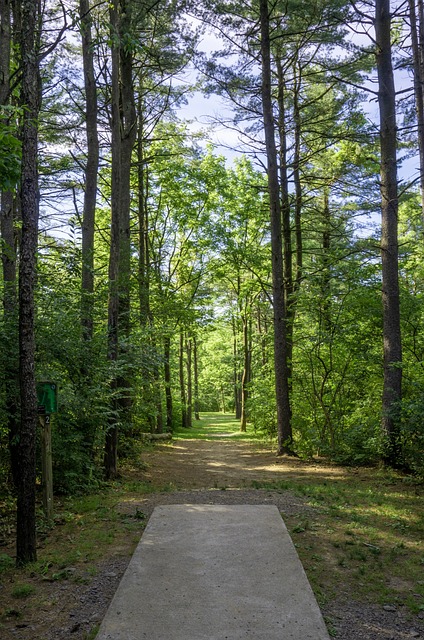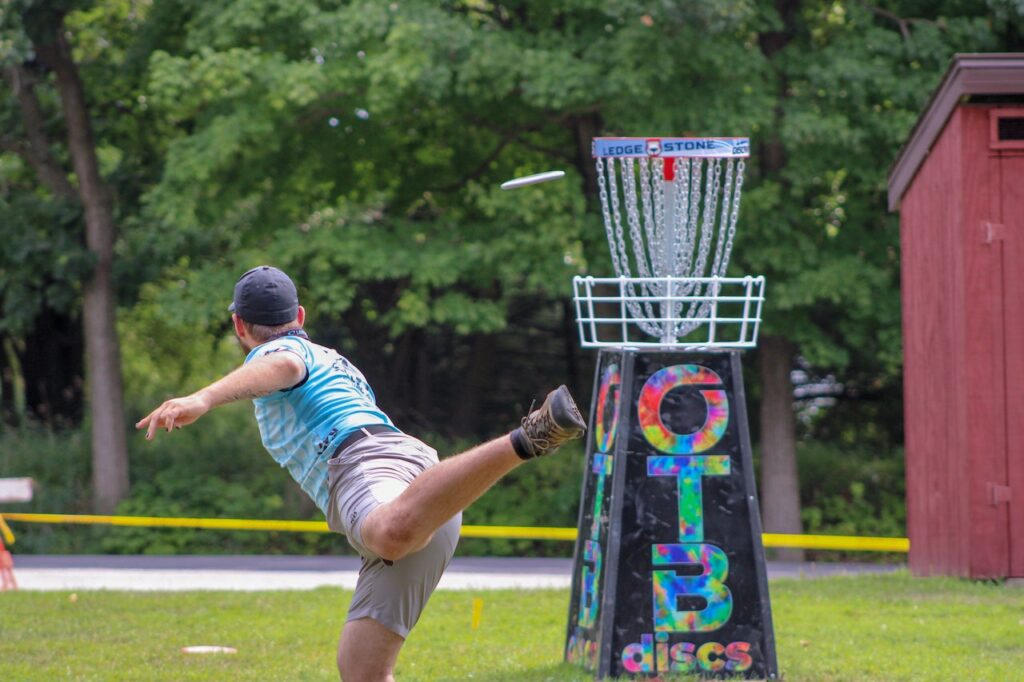Is disc golf good exercise?
Yes, disc golf can be a good form of exercise. While it may not be as physically demanding as some other sports or activities, it still provides several health benefits.
Cardiovascular Health: Playing disc golf involves walking or hiking through the course, which can help improve cardiovascular endurance and strengthen your heart.
Strength and Conditioning: Throwing a disc requires engaging various muscles in your arms, shoulders, and core. As you repeatedly throw the disc, it can help improve your upper body strength and overall coordination.
Balance and Flexibility: Navigating the disc golf course often involves uneven terrain, requiring balance and stability. Constantly reaching and twisting your body to throw the disc also promotes flexibility and range of motion.
Mental Well-being: Being outdoors and engaging in a recreational activity like disc golf can have positive effects on your mental health. It can help reduce stress, improve mood, and provide a sense of relaxation.
While the intensity of exercise may vary depending on the course layout and your playing style, disc golf can still contribute to an active lifestyle and provide a moderate level of physical activity. Additionally, it can be a fun and social way to spend time outdoors while enjoying the game.
How do you exercise in disc golf?
In disc golf, exercise primarily comes from the physical movements involved in playing the game. Here are some ways you can exercise while playing disc golf:
Walking or Hiking: Disc golf courses are typically spread across expansive outdoor areas, often in parks or wooded areas. Walking from hole to hole can involve a significant amount of walking or hiking, depending on the size and layout of the course. This constant movement helps improve cardiovascular health and burns calories.
Throwing the Disc: The act of throwing the disc involves engaging various muscles in your arms, shoulders, and core. Repeatedly throwing the disc requires strength, coordination, and endurance. The more throws you make during a round, the more exercise you’ll get.
Carrying a Bag: Carrying a disc golf bag filled with multiple discs can add some resistance to your walking or hiking, providing a bit of additional workout for your arms, shoulders, and back muscles. You can consider using a backpack-style bag for a more even distribution of weight.
Terrain Challenges: Disc golf courses often have a variety of terrain, including hills, slopes, and uneven surfaces. Negotiating these natural obstacles requires balance, stability, and leg strength. Walking up and down hills and navigating rough terrain can provide a good workout for your legs and core muscles.
Additional Exercises: In addition to playing disc golf, you can incorporate some specific exercises to complement your game. Strengthening exercises such as shoulder exercises, core exercises, and flexibility exercises can help improve your performance and reduce the risk of injuries.
The intensity of exercise in disc golf can vary depending on factors like the course layout, the number of throws you make, and the effort you put into each throw. It’s important to listen to your body, stay hydrated, and warm up before playing to prevent injuries and optimize your exercise experience.
Is disc golf good for losing weight and reducing belly fat?
Disc golf can contribute to weight loss and potentially help reduce belly fat when combined with a balanced diet and overall healthy lifestyle. Here’s how disc golf can be beneficial for weight management:
Calorie Burn: Playing disc golf involves walking, throwing, and navigating the course, which can burn calories. The amount of calories burned will depend on factors such as your weight, intensity of play, and the course’s layout. While it may not be as intense as some other activities, disc golf can still contribute to your overall calorie expenditure and help create a calorie deficit necessary for weight loss.
Increased Physical Activity: Engaging in regular physical activity, such as playing disc golf, can increase your overall daily energy expenditure. By incorporating disc golf into your routine, you can boost your metabolism and burn more calories throughout the day, which can contribute to weight loss over time.
Full-Body Workout: While disc golf may primarily engage your upper body, it also requires walking and navigating various terrains, which engages your lower body muscles. This combination of upper and lower body movements provides a full-body workout, helping to tone muscles and burn calories.
Stress Reduction: Disc golf, like any form of exercise, can help reduce stress levels. Lowering stress can indirectly contribute to weight loss by preventing emotional eating or unhealthy habits that often accompany stress.
However, it’s important to note that weight loss and reducing belly fat are best achieved through a holistic approach that includes a well-balanced diet, regular exercise, and a healthy lifestyle. While disc golf can be a fun and active component of your weight loss journey, it’s important to also focus on other aspects of your overall health. Consulting with a healthcare professional or a registered dietitian can provide personalized guidance and help you develop a comprehensive plan to reach your weight loss goals.
How many calories do 18 holes of disk golf burn?
The number of calories burned during a round of disc golf can vary depending on several factors, including your body weight, the intensity of play, and the course’s layout. It’s challenging to provide an exact number as calorie burn is highly individualized. However, here’s an estimate of the calories burned during 18 holes of disc golf based on an average body weight:
For a person weighing around 150 pounds (68 kilograms), playing a leisurely round of 18 holes of disc golf can burn approximately 250-350 calories. This estimate takes into account the walking involved in navigating the course, throwing the disc multiple times, and the intermittent nature of the activity.
For a person weighing more (e.g., 200 pounds or 91 kilograms), the calorie burn may be slightly higher, potentially ranging from 330-460 calories for the same round of disc golf.
Keep in mind that these figures are approximations and individual variations exist. The actual calorie burn can be influenced by factors such as walking speed, terrain difficulty, intensity of throws, and personal exertion level. Using a fitness tracker or heart rate monitor during the game can provide a more accurate estimate of your calorie expenditure.
What are some other benefits of playing disc golf?
In addition to being a form of exercise, playing disc golf offers several other benefits:
Accessibility: Disc golf is a relatively affordable and accessible sport. Most disc golf courses are located in public parks or open spaces, making it easy to find a nearby course. The equipment required is minimal, with a variety of discs available at different price points. This accessibility makes it a popular activity for people of all ages and skill levels.
Social Interaction: Disc golf can be enjoyed alone, but it also provides an opportunity for social interaction. Playing with friends, and family, or joining local disc golf communities can enhance the experience and foster connections with other players. It’s a great way to spend time outdoors together and enjoy friendly competition or camaraderie.
Mental Well-being: Being in a natural outdoor environment and engaging in physical activity can have positive effects on mental well-being. Disc golf provides an opportunity to disconnect from daily stresses, enjoy the fresh air, and relax. It can help reduce anxiety, improve mood, and promote a sense of well-being.
Strategic Thinking: Disc golf requires strategic thinking and decision-making. Assessing the course layout, choosing the right disc for each throw, and navigating obstacles all involve problem-solving skills. The mental challenge of disc golf can help improve focus, concentration, and strategic planning.
Mind-Body Connection: Playing disc golf involves coordination between your mind and body. You need to visualize your shots, adapt to different throwing techniques, and adjust your aim. Developing this mind-body connection can enhance your motor skills, spatial awareness, and overall coordination.
Outdoor Recreation: Disc golf allows you to enjoy the outdoors and appreciate nature. Courses are often set in scenic locations, providing opportunities to explore different landscapes and enjoy the beauty of parks or wooded areas. Spending time in nature has been shown to have numerous health benefits, including stress reduction and improved mood.
Lifetime Activity: Disc golf is a sport that can be enjoyed throughout your life. It has a low impact on the body compared to some other sports, making it accessible to people of varying fitness levels and ages. Whether you’re a beginner or an experienced player, disc golf offers opportunities for skill development, personal improvement, and continued enjoyment.
These are just a few of the benefits of playing disc golf. Ultimately, it offers a combination of physical activity, mental stimulation, social interaction, and outdoor enjoyment, making it a popular and rewarding recreational pursuit.





